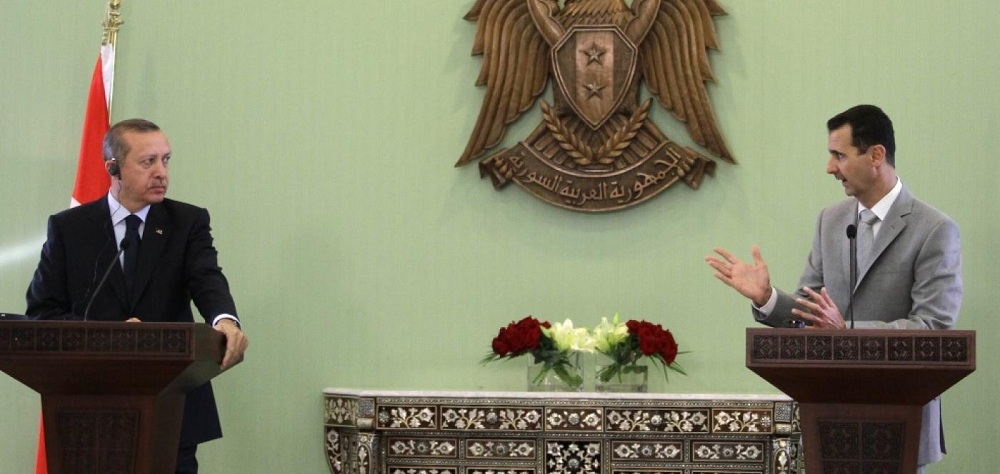Alwaght- Recently, rumors spread that the Turkish President Recep Tayyip Erdogan and his Syrian counterpart Bashar al-Assad have talked using diplomatic backchannels including Russia that is presumably working as a mediator between the two. The rumors come while over the past few days, there have been media reports saying that Turkish party leaders have met with Erdogan and urged him to talk directly with the Syrian leader to scale down the problems Turkey is facing in neighboring Syria. Dogu Perincek, the leader of the Patriotic Party, and Temel Caramollaoglu, the leader of Felicity Party, released a statement in which they called for direct negotiations with the Syrian leader. Diplomatic relations between Ankara and Damascus were cut off in March 2012 as the crisis sparked in the Arab country and they remain in a halt to date.
The crisis in the Turkish-Syrian ties is not only caused by the domestic war of Syria. The two countries are historically in dispute. Turkey in 1939 annexed the Syrian province of Hatay to its territory. Syria to date does not recognize Turkey’s occupation and holds its claim of territorial sovereignty over Hatay. The two countries are also at odds over the Turkish dam projects in the southeastern Anatolia region. Additionally, Turkey claims that Damascus supports the Kurdistan Workers’ Party (PKK), a militia Ankara labels terrorist group, in the face of Turkey.
Ankara-Damascus relations improved in 1998 when Abdullah Ocalan, the head of the PKK, was expelled from northern Syria. However, as the Syrian war erupted in 2012, their relations worsened again, resulting in the severing of diplomatic ties. Still, as the calm relatively returns to large parts of the country and Russia, Iran, and Turkey see their pro-peace efforts help restore the security to Syria, hopes of Syria-Turkey diplomatic normalization have considerably increased. Aydinlik newspaper of Turkey in May reported that at a press conference with the media representatives the Syrian president said: “We do not talk [with Turkey] just through Russia and Iran. The Turkish and Syrian army officers several times talked [directly] on various issues.” Al-Assad also expressed his interest in meeting Erdogan, saying: “We are ready for cooperation with Turkey. If it serves the Syrian interests, I’m ready to meet Erdogan.”
In 2016 and after a visit to Damascus of the Turkish intelligence chief Hakan Fidan, rumors spread that Erdogan and al-Assad could meet with the Russian President Vladimir Putin’s mediation. The meeting did not take place, but now the ground is suitable for such a meeting.
One of the grounds is the Turkish efforts to settle the Syrian refugee crisis. Erdogan is seriously following ways to pave the way for the return of the Syrian refugees to their country. Currently, Turkish camps are hosting 3.5 million Syrian refugees. Ankara has fears that the operation to take back Idlib from the terrorists could unleash new influxes of migrants to the Turkish borders as it could bring the risk of terrorists’ entry to the Turkish territories. About 3 million civilians in Idlib still live under terrorists’ control, tens of thousands of whom now gather on the Turkish border as they fear the start of ground clashes between the government forces and terrorist factions. Syria, willing to see its civilians returning home, can cooperate and give Turkey assistance in this crisis.
Turkey is also worried about threats to its forces who serve inside Turkey, mainly in Idlib province and regions under control of the Syrian Kurds, in 12 posts. This requires Damascus-Ankara coordination to avoid clashes between their forces. After all, the Russian mediation may not fully help remove the risk of confrontation. Aydinlik suggests that the Turkish officers have a bigger understanding of what happens in Syria than the politicians. They have considerable disagreements with Erdogan over Syria, the newspaper noted. Last week, five Turkish army senior commanders resigned from their posts, opening the speculation that one main reason for their resignation is the difficult situation of the Turkish forces in northern Syria.
Moreover, Erdogan could go to direct negotiations with Damascus government as genuine advances over a safe zone in northern Syria remains out of reach with Trump administration amid wide-ranging cooperation between the US and the Syrian Kurdish militia groups. Syria’s green light to Turkey can reveal Erdogan’s development of a will for cooperation with Damascus. A day after presidents of Russia, Iran, and Turkey met in Ankara last week to discuss Syria conditions, Damascus sent two separate letters to the UN chief and the Security Council protesting the American partnership with the Kurds in the east of Euphrates. The Syrian government in the letters labeled the Kurdish Democratic Syrian Forces (SDF) terrorists. The letters triggered concerns among the Kurdish military and political leaders who released a statement saying that Damascus move was an effort for an agreement with Turkey.
Yet another issue is the increasing relations between Turkey and Russia, the staunch ally of Syria, in areas like energy, military, economy, and security. Over the past year, Erdogan and Putin met several times. One major outcome was Russia’s delivery of S-400 air defense systems to Turkey, a move infuriating the US and making it cancel delivery of F-35 fighter jets to Ankara and even threaten Erdogan with economic sanctions.
And finally, the reconstruction of Syria increasingly rises to necessity. Turkey, a neighbor of Syria, has the longest borders with the Arab country. Historical and geographic bonds also link the two countries to each other. Turkey will naturally bid for participation in Syria rebuilding in the post-crisis period and cannot remain indifferent in a would-be race for an economic share in the reconstruction process.



























